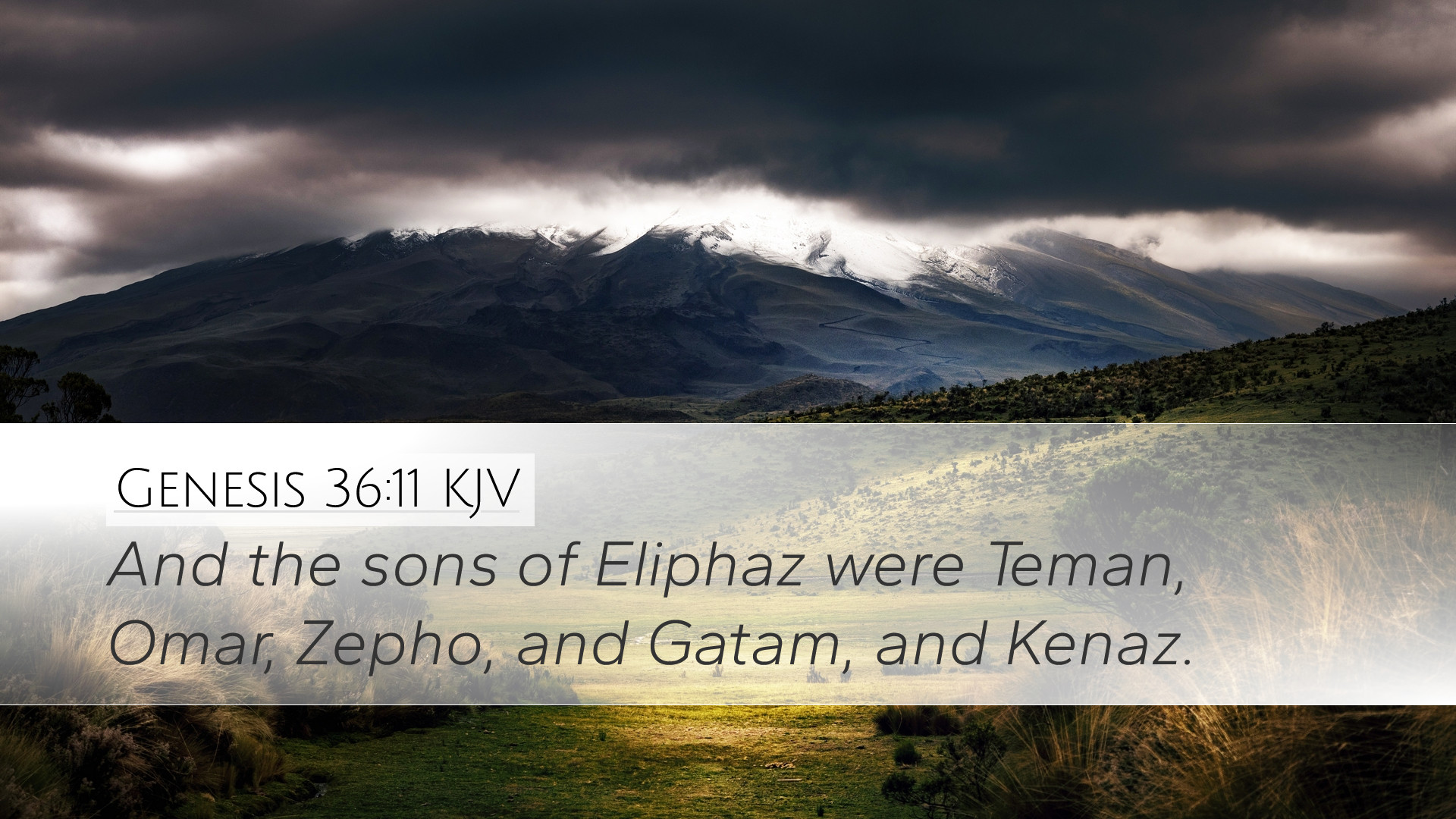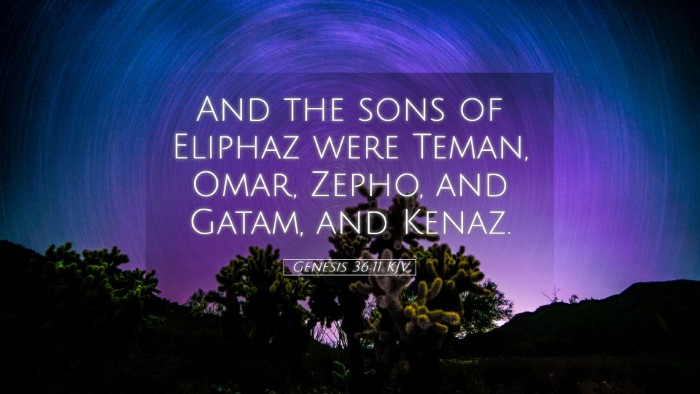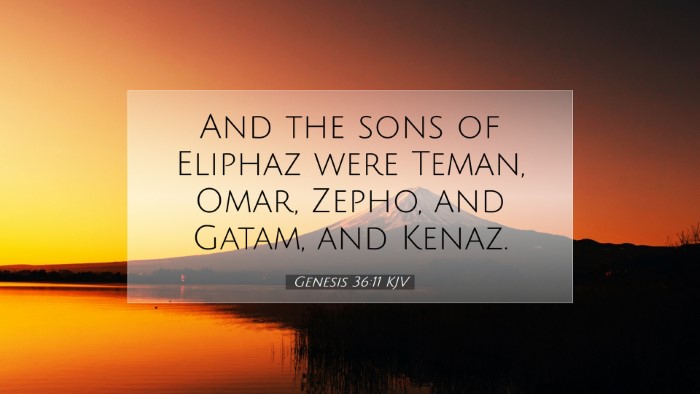Commentary on Genesis 36:11
Verse Context: Genesis 36:11 states, "And the sons of Eliphaz were Teman, Omar, Zepho, and Gatam, and Kenaz." This verse forms part of the genealogy of Esau, providing insight into the lineage that came from him, which is significant in understanding the history of the Edomites.
Introduction to Esau's Descendants
This passage falls within a larger narrative in the Book of Genesis that details the family tree of Esau, the brother of Jacob. It is crucial for understanding the formation of nations and the historical context that influenced Israel's early history. The descendants of Esau, known as Edomites, play an important role in the biblical narrative, often in conflict with the Israelites—a dynamic that underscores much of the Old Testament storyline.
Insights from Matthew Henry's Commentary
Matthew Henry emphasizes the importance of genealogies in Scripture. He notes that genealogies serve not merely as a record of names but as a sign of God's providence in fulfilling His promises. The mention of Esau's sons, particularly Eliphaz and his descendants, serves as a reminder of God's unfolding plan through generations.
- Eliphaz: Henry observes that Eliphaz, the firstborn of Esau, represents strength and power, emphasizing that while Esau was rejected as the heir, his lineage brought forth notable characters.
- Teman and Omar: These names are associated with places in Edom, reflecting how personal names intertwine with geography, showing the edification of a nation.
- Conflict with Israel: Henry also notes that descendants of Esau would later be adversaries of Israel, which highlights a prophetic undertone in their naming.
Albert Barnes' Insights
Albert Barnes provides a detailed analysis of each name mentioned in Genesis 36:11. He suggests that understanding these names can yield insights about the cultures and nations that arose from Esau's line.
- Teman: Often identified with wisdom, it signifies a place known for sage wisdom in the ancient world. It indicates the significance of intellectual prominence in the Edomite culture.
- Omar: Barnes reflects on the possible meaning of the name, as it may have connotations with ‘eloquence’ or ‘blossoming,’ representing a fruitful lineage.
- Zepho: The name Zepho, according to Barnes, may denote a ‘hidden’ or ‘concealed’ quality, possibly suggesting a strategic character in battle or politics.
- Kenaz: Represents perhaps the military aspect of the Edomites; Barnes connects this with biblical accounts of historical conflicts.
Observations from Adam Clarke
Adam Clarke’s exhaustive commentary delves into the cultural and historical implications of this genealogy. He emphasizes the significance of these names in the broader context of Scripture.
- Sociopolitical Landscape: Clarke suggests that the naming patterns reveal a sociopolitical landscape that was both tribal and territorial, which shaped the future interactions with Israel.
- Edomite Nations: He details how the descendants of Esau, particularly through Eliphaz, formed nations that resisted Israel as they sought to claim their own inheritance in Canaan.
- The Role of Names: Clarke stresses that in ancient cultures, names carried profound significance, often reflecting character, traits, and destinies, which is evident in the list of Esau's descendants.
Theological Implications
This genealogy in Genesis opens a window into the nature of God’s design for families and nations. It underscores the belief that God is sovereign over the ebb and flow of human history, shaping events through the lives of individuals and their offspring. Through studying this passage, readers can contemplate how God’s providential hand guides even those perceived as outside of His covenant community.
Application for Today’s Believers
The genealogical records, as encapsulated in Genesis 36:11, remind contemporary believers of the importance of legacy and heritage. Pastors and theologians can draw three key applications:
- Legacy: Each believer is encouraged to consider their own spiritual lineage, recognizing the role that parents and ancestors play in shaping faith trajectories.
- Conflict and Resolution: Understanding the struggles between the descendants of Esau and Israel can inspire discussions about resolving familial and church conflicts today.
- God's Sovereignty: Ultimately, acknowledging God’s sovereignty over nations and individuals can engender faith and trust in God’s plans for the present and future.
Conclusion
Genesis 36:11 serves as more than just a historical record; it is a rich tapestry of God’s design, containing valuable lessons for pastors, scholars, and students of the Word. Through the insights of esteemed commentators, this genealogy unveils themes of conflict, legacy, and divine providence. Each name is a key teasing out the intricate story of God's people and their complex relationships with surrounding nations, setting the stage for the unfolding narrative of Scripture.


